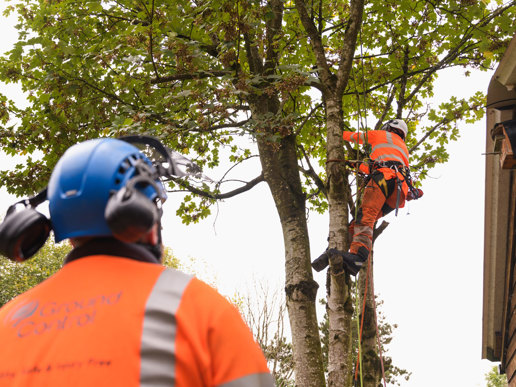Take it or leave it: Understanding leaf litter

Every year large quantities of leaf litter and debris can have unexpected negative consequences for businesses. They cause issues such as clogging drains and gutters, which can lead to flooding and water damage and these issues can halt and even stop businesses from operating.
To stay up to date on this issue, and to understand how Ground Control can help and support, we spoke with National Operations Director, Marc Wilkinson.
- Leaf litter is also commonly called leaf fall. It comprises of any dead plant or tree material that has fallen to the ground.
How can leaf litter negatively affect businesses, and what is the risk of allowing this to build up?
Left in situ and unmanaged, within a commercial or residential environment, leaf litter can present a significant hazard. As leaf litter breaks down and decomposes, it becomes a ‘sludge-like’ medium. On hard surfaces, this will form a dangerously slippery layer which of course can lead to slips, trips and falls for all residents, customers, or staff.
From a site maintenance perspective, leaf litter can block drains, gutters, and cover assets which in turn will cause other associated issues. With the UK experiencing more and more extreme weather, in some areas blocked drains caused by leaf litter can significantly increases the chances of flash flooding.
Finally, from an aesthetic perspective, leaf litter, at all stages of the life cycle, will detract from an area’s appearance should it be aiming for a ‘clean’ look.
Once collected, what can be done to reuse leaf litter to support nutrients in the soil?
The best sustainable use for leaf litter is to create leafmould.
Leafmould is formed from decaying leaves and produces an invaluable soil conditioner. The best quality leafmould is produced from the leaves of Oak, Beech or Hornbeam, however, leafmould can be created from the leaves of all deciduous tree species. The best quality, well-rotted leafmould (more than two years old) can be used as seed-sowing compost, or mixed equally with sharp sand, garden compost and good-quality soil for use as potting compost. Lesser quality leafmould can still be used as mulch, soil improver, autumn top-dressing for lawns, or winter covering for bare soil.
Can the clearance of leaf litter be part of a wider grounds maintenance contract – so customers and clients mitigate issues and keep their businesses safe and operational?
Ground Control can assist with the management of leaf litter on your sites. This can be achieved, either, on a planned or an ad-hoc basis. Costs can be agreed upon as part of a wider grounds maintenance specification or quoted for as and when you require us to intervene.
Leaf Litter clearance

Arborists and tree care teams needed in Ireland






